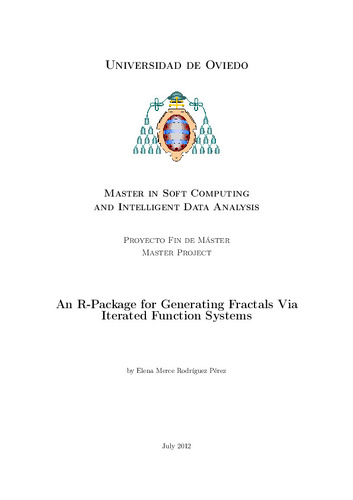An R-Package for Generating Fractals Via Iterated Function Systems
Autor(es) y otros:
Director(es):
Palabra(s) clave:
Fractals
Iterated Function Systems
Soft Computing
Master Project
Measure
Attractor
Fecha de publicación:
Serie:
Máster Universitario en Soft Computing y Análisis Inteligente de Datos
Resumen:
The aim of this master project is the development of an R-Package for generating fractals via iterated function systems (IFS). At first glance fractals are eye-catching, self-similar patterns that form a pretty or interesting picture. However, the inner workings of fractals are much more complex and can be extremely useful in applications for image compression, image animation, for identification and for modeling. Extensive research on fractal theory was undertake to effectively define functions in R capable of handling diverse IFS. Two algorithms are analyzed and implemented in the generation of fractals, the Deterministic Algorithm and the Random Iteration Algorithm. Through the functions developed for an R-package to construct fractals, some of the major theorems and corollaries in fractal theory were successfully verified. Experimentation with IFS with probabilities through the implementation of the Random Iteration Algorithm helps illustrate and define measures on fractals in R^2. Furthermore, a comparison between the Deterministic Algorithm and the Random Iteration Algorithm for generating fractals proves the effective and time efficient use of the Random Iteration Algorithm. The result of this master project is the development of multiple functions to compose an R-package for generating fractals via iterated function systems. Determ_R2 was created to generate fractals in the two-dimensional vector space of real numbers, R^2, via the Deterministic Algorithm. The functions RandItl_R2, RandIt_R3 and RandIt_C were programed to build fractals in R^2, R^3 and the complex plan (C), respectively, using the Random Iteration Algorithm. A function, IFS_Prob, was developed to randomly generate probabilities for a hyperbolic IFS. Additionally, IFSP_Gen_R2 was developed to recursively test random probabilities for a given IFS. The function FractalMeas_R2 calculates the measure of a Borel subset of X, given the limiting coordinates of said Borel subset. Lastly, TransMat_R2 approximates the attractor for an IFS induced by a transformation matrix.
The aim of this master project is the development of an R-Package for generating fractals via iterated function systems (IFS). At first glance fractals are eye-catching, self-similar patterns that form a pretty or interesting picture. However, the inner workings of fractals are much more complex and can be extremely useful in applications for image compression, image animation, for identification and for modeling. Extensive research on fractal theory was undertake to effectively define functions in R capable of handling diverse IFS. Two algorithms are analyzed and implemented in the generation of fractals, the Deterministic Algorithm and the Random Iteration Algorithm. Through the functions developed for an R-package to construct fractals, some of the major theorems and corollaries in fractal theory were successfully verified. Experimentation with IFS with probabilities through the implementation of the Random Iteration Algorithm helps illustrate and define measures on fractals in R^2. Furthermore, a comparison between the Deterministic Algorithm and the Random Iteration Algorithm for generating fractals proves the effective and time efficient use of the Random Iteration Algorithm. The result of this master project is the development of multiple functions to compose an R-package for generating fractals via iterated function systems. Determ_R2 was created to generate fractals in the two-dimensional vector space of real numbers, R^2, via the Deterministic Algorithm. The functions RandItl_R2, RandIt_R3 and RandIt_C were programed to build fractals in R^2, R^3 and the complex plan (C), respectively, using the Random Iteration Algorithm. A function, IFS_Prob, was developed to randomly generate probabilities for a hyperbolic IFS. Additionally, IFSP_Gen_R2 was developed to recursively test random probabilities for a given IFS. The function FractalMeas_R2 calculates the measure of a Borel subset of X, given the limiting coordinates of said Borel subset. Lastly, TransMat_R2 approximates the attractor for an IFS induced by a transformation matrix.
Colecciones
- Indurot [170]
- Trabajos Fin de Máster [5255]
Ficheros en el ítem





